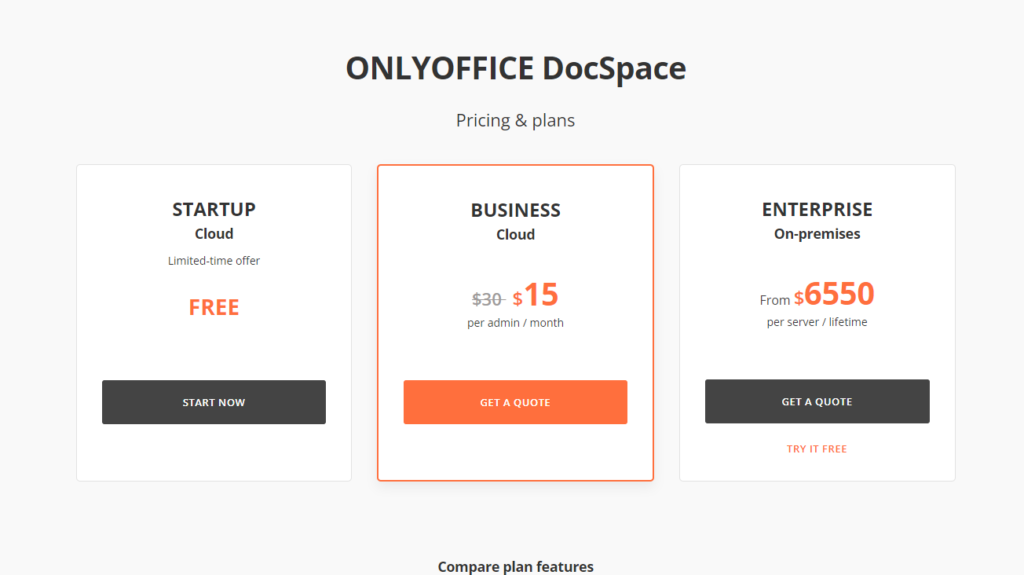Choosing the right document management tool can significantly impact your business efficiency and compliance. In the spotlight today are ONLYOFFICE and Clio, two prominent solutions tailored to distinct business needs. While ONLYOFFICE is known for its versatility across various industries, Clio is designed specifically for legal professionals. Let’s delve into their features, usability, and overall value to help you decide which tool might be the best fit for your operations.
ONLYOFFICE | Clio |
|---|---|
| G2 Score – 4.4 out of 5 stars | G2 Score – 4.6 out of 5 stars |
| TrustRadius Score – 6/10 | TrustRadius Score – 7/10 |
Document Creation and Editing Capabilities
When it comes to document management systems, the core functionalities that often tip the scales are the document creation and editing features. These capabilities are crucial as they directly affect how efficiently team members can produce, modify, and finalize documents.
ONLYOFFICE:
ONLYOFFICE provides a comprehensive suite of office tools that are highly compatible with Microsoft Office formats, ensuring seamless integration into most business environments. The platform offers rich editing features that cater to detailed and complex document formatting needs—making it ideal for businesses that require robust word processing, spreadsheet, and presentation tools.
The interface of ONLYOFFICE is intuitive, mimicking the familiar layout of traditional desktop office applications, which reduces the learning curve for new users. It supports a plethora of file formats and offers features like track changes, document versioning, and comments, enhancing collaboration among team members. Additionally, ONLYOFFICE’s document management capabilities are integrated directly within the editor, allowing users to manage access rights, share documents, and collaborate in real time without leaving the application.
Clio:
Clio, while also providing basic document editing tools, is specifically geared towards the needs of legal professionals. Its document management capabilities are designed to support the creation, storage, and retrieval of legal documents. Clio’s strength lies not just in document editing but in how these documents integrate seamlessly with other case-related information.
For instance, Clio allows legal professionals to create templates for common legal documents, which can be quickly customized for different clients and cases without starting from scratch each time. This feature saves valuable time and ensures consistency across all legal documents. Moreover, Clio provides advanced features tailored for the legal industry, such as matter-centric organization, which allows users to associate documents directly with specific legal cases, and secure document sharing that meets compliance requirements for client confidentiality.
Integration Capabilities
In an era where businesses rely on multiple applications to streamline operations, the integration capabilities of a document management system are vital. How well a platform integrates with other tools can greatly affect your workflow efficiency and data consistency. Let’s evaluate the integration features of ONLYOFFICE and Clio to determine which system might better serve your business needs.
ONLYOFFICE:
ONLYOFFICE is designed with flexibility in mind, offering broad integration capabilities that allow it to function seamlessly within a variety of digital ecosystems. It supports integration with many popular cloud storage providers, such as Google Drive, Dropbox, Box, and OneDrive. This flexibility ensures that users can store and access their documents from anywhere, leveraging their existing cloud storage solutions without needing to migrate data.
Additionally, ONLYOFFICE integrates well with various project management tools, CRM systems, and email platforms, thanks to its robust API and a growing number of third-party plugins. This integration extends the functionality of ONLYOFFICE beyond just document management, making it a versatile hub for all office-related tasks. For businesses using multiple software systems, ONLYOFFICE’s ability to integrate can eliminate the need for constant switching between apps, thereby enhancing productivity and reducing the risk of errors.
Clio:
Clio’s integration capabilities are specifically tailored to meet the needs of legal professionals. While it might not offer as broad a range of integrations as ONLYOFFICE, Clio focuses on depth rather than breadth, providing deep integrations with tools that are most relevant to law practices. This includes seamless connections with legal-specific applications like law practice management software, court calendaring systems, and specialized legal accounting tools.
Moreover, Clio integrates with general business tools such as Google Workspace, Microsoft Office, and even popular accounting software like QuickBooks. This allows law firms to maintain continuity with commonly used business applications while benefiting from Clio’s specialized functionalities. The targeted nature of these integrations ensures that legal professionals can manage cases, track time, bill clients, and handle documents—all within a cohesive system.

Related: Check out our free SEO suite

Security Features
In today’s digital age, the security of a document management system is non-negotiable. Businesses must ensure that their sensitive data is protected against unauthorized access and potential breaches. Let’s compare the security features of ONLYOFFICE and Clio to determine which platform might offer better safeguards for your documents.
ONLYOFFICE:
ONLYOFFICE takes security seriously and offers several robust features designed to protect your documents and data. It employs industry-standard SSL/TLS encryption to safeguard data during transmission and AES-256 encryption for data at rest. This ensures that all documents stored in ONLYOFFICE are secure from external threats.
Moreover, ONLYOFFICE allows administrators to set comprehensive access controls, specifying who can view, edit, or share documents based on their roles within the organization. This role-based access control is crucial for maintaining the integrity and confidentiality of sensitive information.
Another significant aspect of ONLYOFFICE’s security approach includes the use of private rooms, where documents can be edited and discussed in a completely secure environment. This feature encrypts the data during editing, which means not even the service provider has access to the content. For businesses dealing with highly confidential information, this level of security can be particularly appealing.
Clio:
Clio, designed specifically for legal professionals, places a strong emphasis on security, given the sensitive nature of legal documents. Clio complies with several industry standards, including GDPR and data protection laws applicable in various jurisdictions. This compliance is critical for law firms that must adhere to strict regulatory standards.
Clio also uses 256-bit SSL encryption for all data transmission and encrypts all stored data to protect against unauthorized access. Additionally, Clio offers two-factor authentication (2FA), adding an extra layer of security by requiring a second form of identification before users can access their accounts.
Importantly for legal professionals, Clio provides features that help manage and track document access histories, ensuring that firms can audit who accessed or modified documents and when. This capability is essential for compliance and for maintaining the integrity of case-related information.
Scalability and Adaptability
Scalability and adaptability are crucial for businesses planning for growth or those that face fluctuating demands. A document management system should not only fit your current needs but also grow with your business. Let’s evaluate how ONLYOFFICE and Clio handle scalability and adaptability to determine which might be more suitable for evolving business environments.
ONLYOFFICE:
ONLYOFFICE is designed with scalability in mind, catering to businesses of various sizes. Its modular structure allows companies to start with basic features and scale up as their needs grow. This scalability is evident in the array of editions offered, from the free Community version to the more robust Enterprise edition. Each tier adds more features and supports a greater number of users, making it easy for businesses to upgrade as they expand.
In terms of adaptability, ONLYOFFICE excels with its high degree of customization and integration capabilities. The platform can be tailored to fit specific business processes and integrates seamlessly with a variety of other tools. This flexibility ensures that businesses can adapt their workflows as needed without being constrained by their document management system. The ability to integrate with various cloud storage providers and enterprise systems means that ONLYOFFICE can easily fit into any existing IT infrastructure, supporting a smooth transition and reducing implementation challenges.
Clio:
Clio is also scalable but in a way that particularly suits law firms and legal departments. It offers different plans that cater to solo practitioners, small firms, and larger organizations, ensuring that legal professionals have access to the tools they need at each stage of their growth. As firms grow and their needs become more complex, upgrading to a higher plan is straightforward, providing access to additional features such as advanced reporting, court calendaring, and more extensive case management tools.
Clio’s adaptability is particularly focused on the legal industry. It allows law firms to customize workflows and document handling according to legal standards and the specific needs of their practice areas. While this makes Clio highly effective for legal professionals, its specialized focus might limit adaptability outside of this industry.
Advanced Features and Collaboration Tools
Advanced features and collaboration tools are key differentiators in today’s document management systems. They can enhance productivity, streamline communication, and facilitate more efficient document handling within teams. Let’s explore the advanced features and collaboration capabilities of ONLYOFFICE and Clio to see how they cater to different business needs.
ONLYOFFICE:
ONLYOFFICE is equipped with a range of advanced features designed to boost document creation, editing, and management. Notable among these is the co-editing functionality, which allows multiple users to work on the same document simultaneously. This feature is enhanced by real-time collaboration tools such as comments, built-in chat, and track changes, making it easy for teams to collaborate effectively without leaving the document environment.
Furthermore, ONLYOFFICE includes a suite of powerful editing tools that support complex formatting and content creation. These include features like pivot tables, advanced formatting options, mail merge capabilities, and support for macros, catering to users who require sophisticated document processing capabilities.
The platform also offers a unique feature set tailored for project management. Integrated project management tools help teams track progress, assign tasks, set deadlines, and manage calendars directly from within the ONLYOFFICE environment. This integration creates a seamless workflow, reducing the need to switch between multiple applications.
Clio:
Clio, while primarily focused on legal document management, also provides robust collaboration tools tailored to the needs of law firms. Its document management system integrates deeply with other features such as case management, time tracking, and billing. This integration ensures that documents are always connected to the relevant cases, clients, or tasks, facilitating better organization and access.
In terms of collaboration, Clio offers secure sharing features that comply with legal standards for confidentiality and data protection. Documents can be shared securely with clients and colleagues, with detailed permissions and access controls to ensure sensitive information remains protected. Clio also supports version control, which is crucial for legal documents where tracking revisions and edits can be necessary for compliance and record-keeping.
Additionally, Clio includes features for communication within the platform, such as secure messaging and comment threads linked to specific documents or cases. These tools are designed to enhance collaboration within law firms and between attorneys and clients, ensuring all communications are recorded and accessible within the context of the relevant files or cases.
Pricing
ONLYOFFICE:

Clio:

Conclusion
In summing up our comprehensive comparison between ONLYOFFICE and Clio, it’s clear that each platform offers distinct advantages tailored to different organizational needs and preferences.
ONLYOFFICE shines with its highly scalable and flexible infrastructure, making it a superb choice for businesses of all sizes that need a cloud-based solution. Its seamless integration with a wide array of Google services and third-party applications enhances its adaptability, allowing it to serve a diverse range of business operations. ONLYOFFICE is especially suited for companies looking for an intuitive and straightforward document management system that employees can quickly adapt to and use effectively.
Clio, on the other hand, excels in providing a robust, user-friendly document editing experience that closely mirrors Microsoft Office. This makes it an excellent choice for organizations that require advanced document editing capabilities, compatibility with Microsoft formats, and the flexibility to enhance functionality through plugins. ONLYOFFICE is particularly well-suited for businesses that need precise control over document formatting and style, as well as those that collaborate extensively on document creation.
Read Next:
- GetResponse vs Zoho Campaigns: The Best Email Marketing Tool for 2024
- AWeber vs ActiveCampaign: The Best Email Marketing Tool
- Constant Contact vs Campaigner: Best Email Marketing Tool
- GetResponse vs Omnisend: The Best Email Marketing Tool for 2024
- AWeber vs Benchmark Email: The Best Email Marketing Tool





















